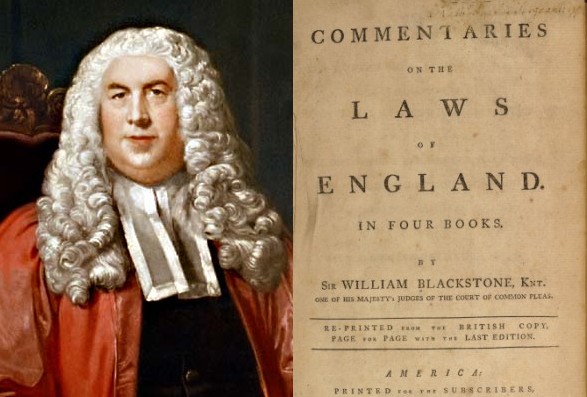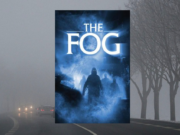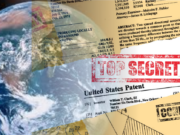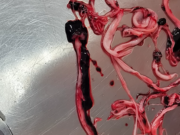 Those were the days.
Those were the days.
by Mary W Maxwell, PhD, LLB
In William Blackstone’s Commentaries on the Laws of England, written in 1769, we find “Offenses against Public Justice.” Just imagine, they actually believed in justice! And they bothered to identify the many ways in which it could be violated. Moreover, mirabile dictu, they went in for punishing the persons who offended against public justice. Wow.
It was Justice Lucy McCallum’s order to “permanently stay the proceedings” in the Toben case that sent me scurrying to Blackstone. Fredrick Toben had sued Nationwide News, and a journalist, for defamation. (See my write-up of the case.)
The defendants, perhaps knowing they would lose, had asked the court not to take the case. They claimed that for Dr Toben to have his day in court would be a bad thing. They predicted he would (horrescendo!) “abuse process.”
Justice Lucy McCallum of the New South Wales Supreme Court apparently agrees with the defendants [Nationwide News] and has ordered a permanent stay of the proceedings. Her decision, dated 30 November, 2015, can be read here. I quote a passage:
“The applicants contended that Dr Toben’s purpose in pursuing the proceedings is not to vindicate his reputation against the imputations he has specified but rather to use the process of the Court as a forum in which to create a record of his beliefs concerning the Holocaust and about Jews. … Dr Toben is otherwise restrained by orders of the Federal Court of Australia (per Branson J) from publishing material that conveys the following meanings:
- that there is serious doubt that the Holocaust occurred;
- that it is unlikely that there were homicidal gas chambers at Auschwitz….”
This leaves me gasping. Even if Fredrick Toben wants to run at the mouth about this or that, he must not be barred from his civil right to sue someone. Litigants run at the mouth all the time.
Anyway, it’s not an “abuse of process” to use a courtroom to establish the truth about something. Courts are supposed to do that – it is their stock in trade, isn’t it?
If you were to read the full case you would see that Toben, who is nothing if not a stickler for the exact meaning of words, has lately had to avoid saying what he really means. He is prevented from being as frank as he would like to be. The court is making him perform contortions. It’s awful. In Australia yet! In the 21st century!
Free Speech
Well, I’m not under restrictions. I can talk turkey. Toben some years ago learned that the museum at Auschwitz had changed its claim from being the site of 4 million deaths to being the site of only 1.5 million. OK, that sort of thing is normal. But then, he asked, why wasn’t the universal headcount of 6 million dead adjusted accordingly?
Anyone could calculate (if there were no taboo on doing so) that the 2.5 million error had to be subtracted, resulting in 4.5. But no, the 6 million figure was to be held sacred. In 1985 the 6 million figure became law in Germany. “Holocaust minimization” is a crime. Thousands have already been jailed for this crime! Fathom it.
One thing led to another, and Toben and European revisionist historians figured out that there had been a massive and deceitful propaganda campaign. We now know such a thing to be routine in politics. One has only to look at the fairy story of 19 hijackers on 9-11, to see how easy it is for media to put across a full-blown myth, overnight.
If the count of 6 million be wrong, there’s no point in trying to suppress it, folks. The “need to avoid hurting people’s feelings” can’t be the guiding legal principle here, can it? People’s feelings get hurt all the time, including Fredrick Toben’s. How must he feel when he sees the New South Wales Supreme Court turning him away like vermin?
OFFENSES AGAINST PUBLIC JUSTICE
Let’s look at how scholars in the olden days thought about protecting the law as a value in itself. All below is quoted from Book 4 of Sir William Blackstone’s Commentaries.
Note: I have trimmed the wording of the 21 offenses, but changed nothing. I added remarks in brackets. I’ve used bolding to show where the law ought to be revived today to correspond with this age-old thinking.
- EMBEZZLING or vacating records, or falsifying certain other proceedings in a court of judicature, is a felonious offense against public justice. It is enacted by statute 8 Hen. VI. that if any clerk, or other person, shall willfully take away, withdraw, or avoid any record, or process in the superior courts of justice in Westminster-hall, by reason whereof the judgment shall be reversed; it is felony not only in the principal actors, but also in their abettors. …
- TO prevent abuses by the extensive power, which the law is obliged to repose in jailers, it is enacted by statute 14 Edw. III. c. 10. that if any jailer by too great duress of imprisonment makes any prisoner that he has in ward, become an approver or an appellor against his will; it is felony in the jailer. [Glory be to God – Martin Bryant and Jahar Tsarnaez!]
- A THIRD offense against public justice is obstructing the execution of lawful process. This is at all times an offense of a very high and presumptuous nature; And it has been held, that the party opposing such arrest [of a criminal] becomes thereby an accessory in felony, and a principal in high treason. [That’s because law is sacred.]
- AN escape of a person, by eluding the vigilance of his keepers before he is put in hold, is also an offense against public justice, and the party himself is punishable …. But the officer cannot be thus punished, till the original delinquent is actually found guilty or convicted, by verdict, confession, or outlawry. [Outlawry comes into effect when the miscreant cannot be caught by the authorities. All citizens are then under a duty to catch him and will be punished for harboring him or feeding him. Yay!]
- BREACH of prison by the offender himself, when committed for any cause, was felony at the common law: But this severity is mitigated by the statute de frangentibus prisonam 1 Edw. II. which enacts, that no person shall have judgment of life or member [!!!!!!], for breaking prison, unless committed for some capital offense.
- RESCUE. By the statute, 16 Geo. II. c. 31. to assist a prisoner with any arms, instruments of escape, or disguise, though no escape be actually made, is felony, and subjects the offender to transportation for seven years … or for any of the offenses enumerated in that act, or in the black act. [The Black Act prohibited darkening your face so as not to be seen when on a poaching raid. Merely to be caught in the forest wearing a disguise was a crime. Makes sense to me.]
- ANOTHER capital offense against public justice is the returning from transportation, or being seen at large in Great Britain before the expiration of the term. [Can’t be referring to Botany Bay, as Blackstone’s Commentaries in 1769 were pre-Cook.]
- AN eighth is that of taking a reward, under pretense of helping the owner to his stolen goods. This was a contrivance carried to a great length of villainy in the beginning of the reign of George the first. [Larry Silverstein and Frank Lowy re 3 billion for the towers?]
- RECEIVING of stolen goods, knowing them to be stolen, is also a high misdemeanor and affront to public justice. This offense, which is only a misdemeanor at common law, by the statutes 3 & 4 William & Mary c. 9. and 5 Ann. c. 31. makes the offender accessory.
- OF a nature somewhat similar to the two last is the offense of theft-bote, which is where the party robbed not only knows the felon, but also takes his goods upon agreement not to prosecute. This perversion of justice, in the old Gothic constitutions, was liable to the most severe and infamous punishment. By statute 25 Geo. II. c. 36. even to advertise a reward for the return of things stolen, with no questions asked, subjects the advertiser and the printer to a forfeiture of 50 £ each. [Still in force today. See how it is the law that is being respected here!]
- COMMON barretry is the offense of frequently exciting and stirring up suits and quarrels between his majesty’s subjects, either at law or otherwise…. if the offender (as is too frequently the case) belongs to the profession of the law, ought also to be disabled from practicing for the future. …and treble damages to the party injured. [Yipee!]
- MAINTENANCE is an offense being an officious intermeddling in a suit. And therefore, by the Roman law, it was a species of the crimen falsi [forgery] to enter into any confederacy, or do any act to support another’s lawsuit, by money, or witnesses. [as in FBI informants.]
- CHAMPERTY, campi-partitio, is a species of maintenance, being a bargain with a plaintiff of defendant to divide the land or other matter sued for between them. These pests of civil society, perpetually endeavoring to disturb the repose of their neighbors, were severely animadverted on by the Roman law: “lege Julia de vi privata tenentur” — they are liable to the Julian law of secret influence.” [I wonder what that means. Sounds useful.]
- THE compounding of informations upon penal statutes contributeS to make the laws odious to the people. At once therefore to discourage malicious informers, and to provide that offenses, when once discovered, shall be duly prosecuted, it is enacted by statute 18 Eliz. c. 5. that if any person, informing under pretense of any penal law, shall stand two hours on the pillory, and shall be forever disabled to sue. [“I have a bad back, Your Honor…”]
- A CONSPIRACY also to indict an innocent man of felony falsely and maliciously, is a farther abuse and perversion of public justice; for which the party injured were by the ancient common law to receive what is called the villainous judgment; viz. to have those lands wasted, their houses razed, their trees rooted up. But it now is the better opinion, that the villainous judgment is by long disuse become obsolete. [Aw, too bad.]
 Sir Edward Coke in 1614, author of “The Institutes of the Laws of England”
Sir Edward Coke in 1614, author of “The Institutes of the Laws of England”
- THE next offense against public justice is the crime of willful and corrupt perjury; which is defined by Sir Edward Coke, to be a crime committed when a lawful oath is administered, in some judicial proceeding, to a person who swears willfully, absolutely and falsely, in a matter material to the issue or point in question. Subornation of perjury is the offense of procuring another to take such a false oath…. The punishment has been various. It was anciently death; afterwards banishment, or cutting out the tongue, then forfeiture of goods; and now it is fine and imprisonment, and never more to be capable of bearing testimony. But the statute 5 Eliz. c. 9. inflicts the penalty of perpetual infamy, and a fine of 40£ on the suborner; and to stand with both ears nailed to the pillory. [Best not to suborn.] And certainly the odiousness of the crime pleads strongly in behalf of the French law. But that there they admit witnesses to be heard only on the side of the prosecution, and use the rack to extort a confession from the accused. [Freedom fries, anyone?]
- BRIBERY is the next species of offense against public justice; which is when a judge, or other person concerned in the administration of justice, takes any undue reward to influence his behavior in his office. … In England this offense of taking bribes is punished, in inferior officers, with fine and imprisonment. But in judges, especially the superior ones, it has been always looked upon as so heinous an offense, that the chief justice Thorpe was hanged for it in the reign of Edward III. [Think about it.]
- EMBRACERY is an attempt to influence a jury corruptly to one side by promises, persuasions, entreaties, money, entertainments [e.g., showing the video of the Marathon bombing over and over], and the like.
- THE false verdict of jurors, whether occasioned by embracery or not, was anciently considered as criminal, and therefore exemplarily punished by attaint.
- ANOTHER offense of the same species is the negligence of public officers, entrusted with the administration of justice, as sheriffs, coroners, constables, and the like.
- THERE is yet another offense against public justice, which is a crime of deep malignity; and the power and wealth of the offenders may often deter the injured from a legal prosecution. [Elementary, my dear Watson.] This is the oppression and tyrannical partiality of judges, justices, and other magistrates, in the administration and under the color of their office.
We need to get cracking on these things. Let 1769 and 2016 be famous years!
— Mary Maxwell lives in Adelaide. She and Dee McLachlan are producing a Fringe program entitled “Pardoners R Us,” based on Chaucer’s “Canterbury Tales.” Her latest book is “Fraud Upon the Court: Reclaiming the Law Joyfully” (Trine Day Press, Oregon).






























He zips through the Tudors, the Stuarts, and the Hanovers — JUST LIKE THAT!
Swearda God. There’s a Youtube channel on Blackstone.
https://www.youtube.com/watch?v=tyOanx0fAmY
It’s provided by these folks:
“Sir William Blackstone Institute of Law LLC is based in the silicon valley of California, US. The mission of Blackstone Law is to preparing compassionate and ethical legal professionals through transformed legal education. The institute harnesses the power of critical thinking, animation, storytelling and conscious teaching to create responsible citizens and successful lawyers around the world.”
Note: Canadian Attorney Doug Christie, defender of free speech, died in 2013 of liver cancer, age 66. Said the National Post:
“Perhaps inevitably, Mr. Christie has been accused of being a fellow traveller with racists, and defending them because he shares their beliefs. As such, he stands as an extreme case study in whether it is fair to judge a lawyer by his clients.
[HELLO?]
“In 1993, the Law Society of Ontario dropped misconduct charges over his defense of Zundel and Finta,
[CAN YOU IMAGINE!]
but the chair of its discipline panel nevertheless issued a report saying Mr. Christie ‘made common cause with a small, lunatic, anti-Semitic fringe element in our society.’
“He also sued a B.C. broadcaster, Gary Bannerman, in 1990 for saying that he has “aligned himself so many times with these perverted monsters that he has to be viewed as one himself.
“Mr. Christie lost on grounds of fair comment, at both trial and appeal.”
I read the Zundel transcripts and there was nothing ‘racist’ in it. However, Christie did a great job of exposing a bunch of liars for the frauds they were. It appears that was his ‘misconduct’.
‘made common cause with a small, lunatic, anti-Semitic fringe element in our society.’ – I expect that must have been the ‘revisionists’ that provided the ammunition for his devastating cross-examinations.
A correction. I thought Toben had started his case in a lower court and that the NSW Supreme Court order was an affirmaion of that. No. Toben has just informed me that he began the case in the NSW Supreme Court. Justice Lucy McCallum’s decision is the first one he has received. He plans to appeal.
I think he will win on appeal. Australia has not moved into the Dark Ages. Pardon me but I am taking enormous encouragement daily from what I see at the Royal Commission into Institutional Responses to Child Sexual Abuse. Justice Peter McClennan is acting like Blackstone. He is phenomenal.
Rejoice! Rejoice!
Thanks to the Editor of Gumshoe for applying a little white-out to my fourth paragraph. The article now correctly shows the stae of the case, I believe.
I am on record saying that I think the brouhaha re Holocaust denial laws is intended (by the Powers The Be) to stir up trouble AGAINST any and all Jewish people. See, for example Chapter 22 of my book, Fraud Upon the Court.
Although it looks like the “deniers” are the victims — no doubt their lives have been greatly disturbed; they have been persecuted and impoverished by it – it could well be that there is a divide-and-rule agenda here.
So who is responsible for the problem? I would blame the legislature of Germany for passing the law, in 1985, known as Section 130 of the German Criminal Code, that outlaws discussion of the Holoaust.
So if historians want to complain, the legislature of Germany, and of some other EU countries, would be a good place to lodge the complaint. Nevertheless, if it should turn out that an Australian court makes an impressive ruling about the “right” to talk about historical matters, so be it. We will have broken a worldwide impasse. Yay Australia!
And maybe done a huge favor to Jews into the bargain. Yay Children of Abraham!
Oopsie. I just went to the offending chapter of my book, and found this: “The dead are crying out from their graves for us to get at the truth of who has caused such horrible events – and who, today, are planning much worse.”
[…] I mentioned, the TV shows are also going at full tilt about such Blackstone-type sins as “obstruction of justice.” That is, Trump’s firing of Comey is being portrayed as […]
[…] at meetings, gives out copies if Blackstone’s Commentaries (abridged, of course). I don’t think Blackstone has ever been bested or ever can be. One of his ideas in the 18th century was THE USE OF LAW TO […]
[…] (Ursula was recently charged with a crime for that, not for her Breslau complaint.) See my Gumshoe article “Sir William Blackstone and the Fredrick Toben […]
[…] criticized by one of our GumshoeNews readers for skirting around the subject of Holocaust denialism here and here, rather than presenting the content of the denialists’ […]